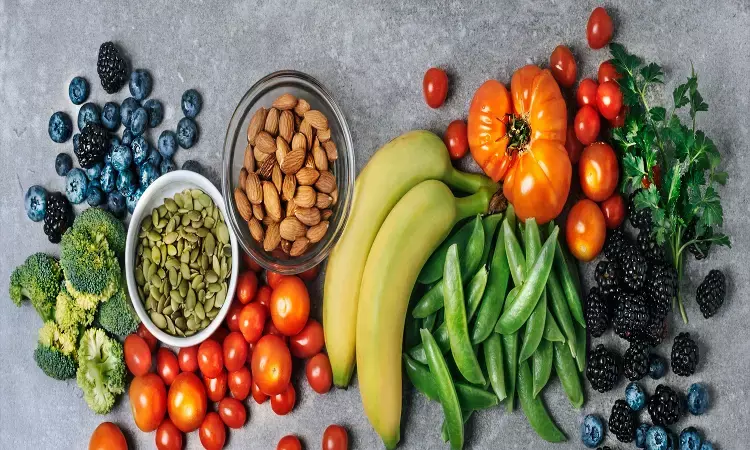- Home
- Medical news & Guidelines
- Anesthesiology
- Cardiology and CTVS
- Critical Care
- Dentistry
- Dermatology
- Diabetes and Endocrinology
- ENT
- Gastroenterology
- Medicine
- Nephrology
- Neurology
- Obstretics-Gynaecology
- Oncology
- Ophthalmology
- Orthopaedics
- Pediatrics-Neonatology
- Psychiatry
- Pulmonology
- Radiology
- Surgery
- Urology
- Laboratory Medicine
- Diet
- Nursing
- Paramedical
- Physiotherapy
- Health news
- Fact Check
- Bone Health Fact Check
- Brain Health Fact Check
- Cancer Related Fact Check
- Child Care Fact Check
- Dental and oral health fact check
- Diabetes and metabolic health fact check
- Diet and Nutrition Fact Check
- Eye and ENT Care Fact Check
- Fitness fact check
- Gut health fact check
- Heart health fact check
- Kidney health fact check
- Medical education fact check
- Men's health fact check
- Respiratory fact check
- Skin and hair care fact check
- Vaccine and Immunization fact check
- Women's health fact check
- AYUSH
- State News
- Andaman and Nicobar Islands
- Andhra Pradesh
- Arunachal Pradesh
- Assam
- Bihar
- Chandigarh
- Chattisgarh
- Dadra and Nagar Haveli
- Daman and Diu
- Delhi
- Goa
- Gujarat
- Haryana
- Himachal Pradesh
- Jammu & Kashmir
- Jharkhand
- Karnataka
- Kerala
- Ladakh
- Lakshadweep
- Madhya Pradesh
- Maharashtra
- Manipur
- Meghalaya
- Mizoram
- Nagaland
- Odisha
- Puducherry
- Punjab
- Rajasthan
- Sikkim
- Tamil Nadu
- Telangana
- Tripura
- Uttar Pradesh
- Uttrakhand
- West Bengal
- Medical Education
- Industry
DASH diet most effective for keeping your BP in check: JAHA

China: DASH diet is the most effective nonpharmacologic way of reducing BP in patients with high blood pressure (hypertension), suggests a recent study in the Journal of the American Heart Association. Other interventions that cast a positive effect on BP lowering include meditation, low-calorie diet, breathing control, salt restriction, comprehensive lifestyle modification, low-sodium and high-potassium salt, isometric training, and aerobic exercise.
Hypertension is a global public health problem. The number of patients affected by hypertension is expected to increase to about 1.5 billion by 2025. This could be attributed to varied factors including unhealthy lifestyles and increased body weight. Hypertension, if uncontrolled can lead to severe cardiovascular events including stroke and myocardial infarction.
Pharmacotherapy with first‐line antihypertensive agents helps in a significant lowering of BP but also has side effects, financial burden, and treatment resistance. In lieu of this, there arises a need for low‐cost, sustainable, widely available, and effective strategies for the management and prevention of hypertension.
Nonpharmacologic interventions that modify lifestyle can lower BP has been assessed in numerous randomized controlled trials and pairwise meta‐analyses. Still, it not clear which intervention is the most effective. Jinming Fu, Harbin Medical University, China, and colleagues aimed to assess the comparative effectiveness of different nonpharmacologic interventions for reducing BP in adults with prehypertension to established hypertension and to determine the most efficacious intervention.
The researchers performed the network meta‐analyses to finding the comparative effectiveness of different interventions for lowering BP. A total of 120 eligible articles comprising of 14 923 participants were included. The studies assessed 22 nonpharmacologic interventions.
Key findings of the study include:
- According to the surface under the cumulative ranking probabilities and Grading of Recommendations Assessment, Development and Evaluation (GRADE) quality of evidence, for adults with prehypertension to established hypertension, high‐quality evidence indicated that the Dietary Approach to Stop Hypertension (DASH) was superior to usual care and all other nonpharmacologic interventions in lowering systolic BP (weighted mean difference, 6.97 mm Hg) and diastolic BP (weighted mean difference, 3.54 mm Hg).
- Compared with usual care, moderate‐ to high‐quality evidence indicated that aerobic exercise, isometric training, low‐sodium and high‐potassium salt, comprehensive lifestyle modification, breathing‐control, and meditation could lower systolic BP and diastolic BP.
- For patients with hypertension, moderate‐ to high‐quality evidence suggested that the interventions listed (except comprehensive lifestyle modification) were associated with greater systolic BP and diastolic BP reduction than usual care; salt restriction was also effective in lowering both systolic BP and diastolic BP.
- Among overweight and obese participants, low‐calorie diet and low‐calorie diet plus exercise could lower more BP than exercise.
"To summarize DASH was the most effective intervention in lowering BP for adults with prehypertension to established hypertension. Aerobic exercise, isometric training, low‐sodium and high‐potassium salt, comprehensive lifestyle modification, breathing control, meditation, and low‐calorie diet also had obvious effects in lowering BP. Moreover, our findings suggest that salt restriction be used for lowering BP, especially in patients with hypertension," concluded the authors.
The study, "Nonpharmacologic Interventions for Reducing Blood Pressure in Adults With Prehypertension to Established Hypertension," is published in the Journal of the American Heart Association.
DOI: https://www.ahajournals.org/doi/full/10.1161/JAHA.120.016804
Dr Kamal Kant Kohli-MBBS, DTCD- a chest specialist with more than 30 years of practice and a flair for writing clinical articles, Dr Kamal Kant Kohli joined Medical Dialogues as a Chief Editor of Medical News. Besides writing articles, as an editor, he proofreads and verifies all the medical content published on Medical Dialogues including those coming from journals, studies,medical conferences,guidelines etc. Email: drkohli@medicaldialogues.in. Contact no. 011-43720751


